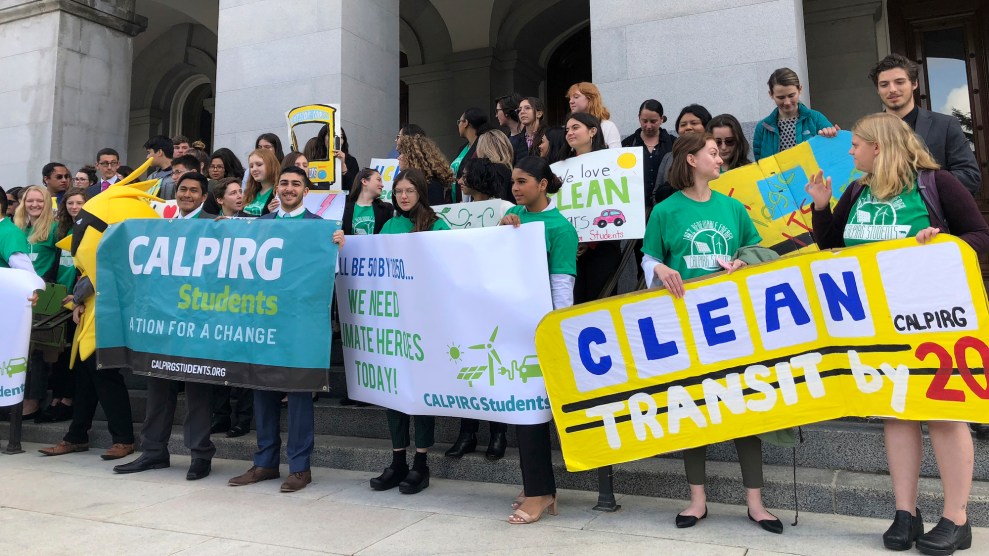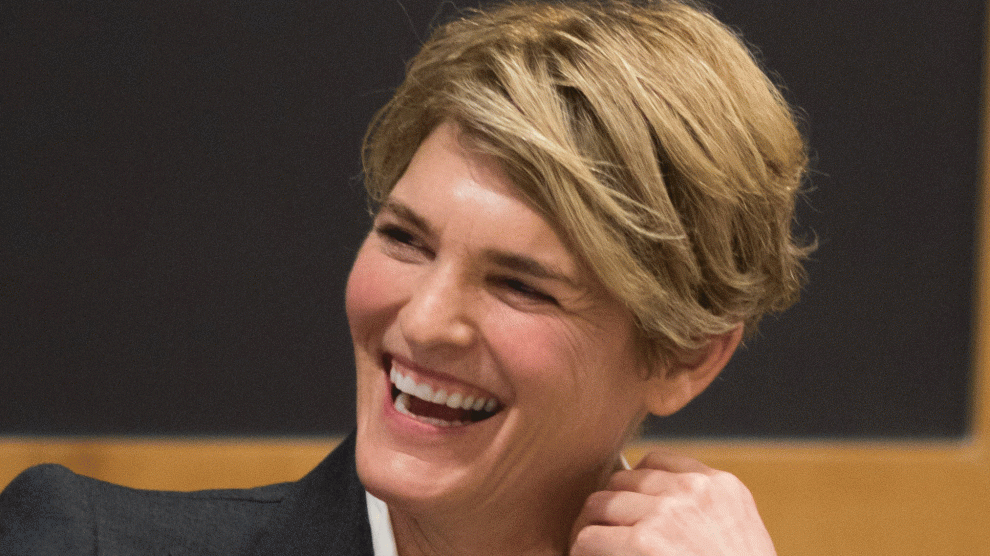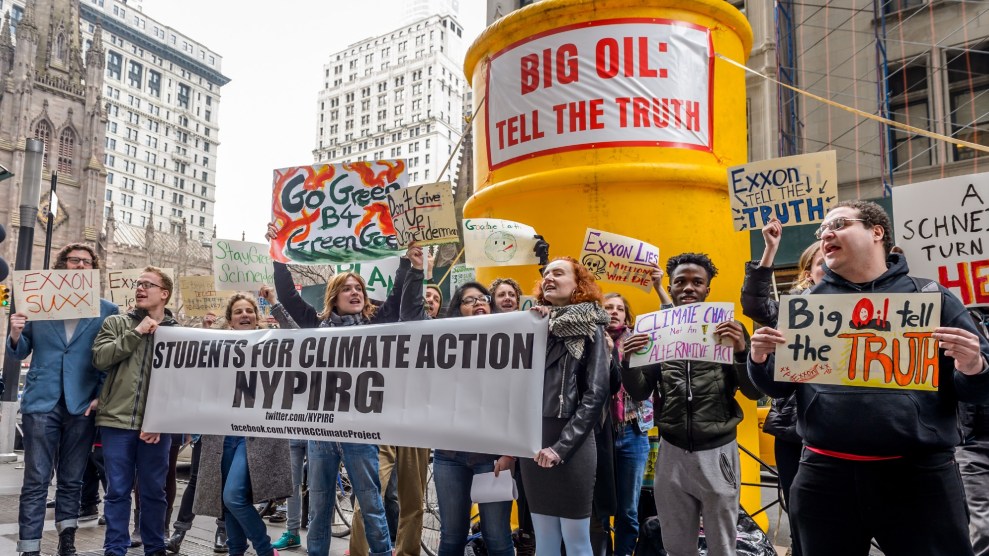
Students who are part of the advocacy group CALPIRG from eight University of California campuses gather on the steps of the Capitol in Sacramento in 2019.Kathleen Ronayne/AP
This story was originally published by the Guardian and is reproduced here as part of the Climate Desk collaboration.
At least 20 board members at California public universities have direct ties to the fossil fuel industry, a new analysis has found, sparking criticism from climate advocates on and off campus.
Of the state’s 32 public universities, board members at one-third of them either work or have worked for oil and gas companies, as do two board members at the California State University’s foundation.
The University of California became the largest educational system in the US to divest from fossil fuels in May 2020, and the following year, California State University followed suit.
But despite these major wins for the divestment movement, the new analysis from climate-focused research group Sunstone Strategies suggests the schools, which serve more than a quarter of a million students, still have links through their boards to the oil and gas sector, which remains powerful in California.
The analysis found:
-
John S Watson, former Chevron CEO, sits on the University of California Davis chancellor’s board of advisers.
-
Stephen Strachan, who until this past December headed the oil and gas production firm Strachan Exploration Corporation, is a member of the UC San Diego Foundation’s foundation board of trustees.
-
Henry Perea, a government affairs manager for oil and gas giant Chevron, sits on the board of governors at the California State University foundation, as does Gillian A Wright, senior vice-president at gas distribution utility SoCalGas.
-
Megan Lopez, who is Chevron’s policy, government and public affairs representative, sits on the board of California State University, Bakersfield, as do higher-ups at oil company Kern Oil and Refining, fossil fuel exploration company California Resources Corporation, and oil and gas exploration company Aera Energy.
Additionally more than a dozen other members of the boards of trustees, advisers, governors, and directors at the University of California and California State University schools are current or former oil and gas executives, presidents or lobbyists, or have other ties to the fossil fuel industry. These roles come with a variety of responsibilities, from fundraising to advising senior university leadership.
These board memberships are a form of “infiltration” by polluters into academia, said Alicia Colomer, communications and operations coordinator at the group Fossil Free Research, which advocates for research institutions to cut all ties with the fossil fuel industry. This influence, she said, does not stay within the institutions.
“The reports and research that comes out of prestigious universities actually goes on to influence lawmakers and policymakers and then goes on to create real harm in our communities,” she said. “There’s a very clear trickle-down effect from universities down to think tanks and to policymakers and legislators.”
Board members, she said, are sometimes responsible for making important decisions at universities, including developing the mission, focus and goals of research institutions, and establishing internal university policies.
Universities and firms associated with board members which responded to requests to comment from the Guardian defended their positions and disputed assertions they influenced university polices or research priorities.
Mark Delos Reyes Davis, a spokesperson for the University of California, Santa Cruz, said the university was “founded on social and environmental justice,” and that “no person, industry, or organization has steered research away from that work.” The school recently opened a new Center for Coastal Climate Resilience, he said.
Linda Peterson, retired associate general counsel for the oil company Occidental, sits on the UC Santa Cruz Foundation board of trustees. But Reyes Davis says that body does not govern campus activity and has no role in directing the school’s research, but rather focuses on raising money for the school.
These foundations, however, allow public universities use to maintain ties to corporate interests and can informally set funding priorities, said Colomer of Fossil Free Research. She said it was not right to claim industry figures “do not wield substantial influence in guiding the direction of a university.”
Bill Kisliuk, spokesperson for UC Davis, said that his university has “dramatically” cut fossil fuel use and has additional climate plans in the works, and that members of the university’s chancellor’s and foundation boards, “while making valuable contributions to the university,” don’t control university policy or research.
Mark Huising, biology professor at UC Davis and climate advocate, praised the university’s climate plans but said they cannot be an “excuse” to maintain other ties to the oil industry which has placed “their short-term profits over the best interests and wellbeing of the generation of students we teach.”
UC Davis has partnered with and accepted funding from Chevron, of which John Watson was the CEO from 2010 to 2018. Watson sits on the school’s chancellor’s board of advisers. “We reject the notion that there is no connection,” said Colomer.
Reyes Davis, of UC Santa Cruz, said that in his home state of California, some business executives “support efforts” to mitigate the climate crisis. “It is part of the education mission of the university to help instill environmental justice values with our graduates,” he said.
Amy Bentley-Smith, director of strategic communications and public affairs at the California State University chancellor’s office, said that her university system is committed to “economic viability, environmental protection, and social equity,” and that the fossil fuel sector can help achieve those goals.
Adam Cooper, a PhD candidate in atmospheric chemistry at the University of California San Diego, said, however, that fossil fuel companies have revealed that they are “bad faith partners” through their failure to transition their business models or raise the alarm about the climate crisis.
Corporate board members, he said, should be replaced with people who are hit hardest by the effects of fossil fuel pollution and the climate crisis.
Five of the board members in the analysis have ties to Chevron, one of the world’s most carbon-emitting companies. Chevron spokesperson Allen Ross pointed to the company’s various education partnerships and funding, and said “working with university leadership to build a bright future for the state” is part of its commitment to education.
Climate researchers and advocates have found that big oil’s involvement in schools has also led to fossil fuel-aligned lesson plans and scholarship.
Even board members who have retired from such positions are not to be trusted, because they often still hold relationships in the industry, said Miriam Eide, a director at climate group Fossil Free California. “They will guide university decisions based on their history of compromising on human life, choosing to pollute the air and water we breathe or perhaps not being willing to critically consider the impacts of their actions,” she said.
The University of California, UC San Diego, and California State University at Bakersfield did not respond to requests for comment.
Some board members listed in the analysis have had a major influence on California climate policy. Before his current position at Chevron, California State University foundation board member Henry Perea fought climate policy as a state assembly member and later as a lobbyist.
“People who were delaying climate action in California, in San Diego, on campus, they shouldn’t have these really influential positions within the leadership of our campus,” said Cooper, who has spent years raising the alarm about his school’s ties to fossil fuel interests.
The new analysis comes amid increasing scrutiny into the university’s various fossil fuel industry connections. Last month, Jody Freeman, a renowned environmental lawyer at Harvard University, stepped down from a highly paid role at the oil and gas giant ConocoPhillips following months of pressure from climate activists.
In May, the Guardian revealed that a senior scientific adviser at ExxonMobil had an office at Princeton University. That same month, a study from the think tank Data for Progress and the non-profit group Fossil-Free Research found that six major coal, oil and gas companies funneled more than $700 million in research funding to 27 US universities over a decade.
















